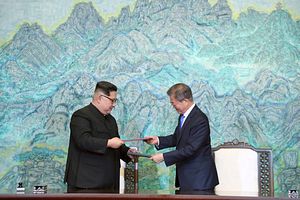Beyond perceptions among some that the first Moon-Kim Summit was a resounding success lie deeper implications related to how impactful the various agreements reached at the summit really are, how these agreements influence regional and international security, and how this summit might affect the upcoming Trump-Kim summit to be held in late May or June.
How Impactful are the Summit’s Agreements?
From a state of serious antagonism several months ago to the meeting last week between North Korea’s Kim Jong-un and South Korea’s Moon Jae-in, the summit can be seen as a success due to the raft of positive agreements struck. However, these agreements need to be critically evaluated and they fall into three categories. Firstly those which are easily undone but good for inter-Korean morale; secondly, those which have the potential to bring about enduring positive change; and, lastly, those that sound good but are insubstantial.
Referencing the first group, Seoul and Pyongyang have agreed to resume reunions of family members separated by the Korean War, set up a liaison office in Kaesong, and refrain from hostile action at the borders. These signal improving North-South relations but can easily be undone via executive order if disputes arise.
Next, both sides pledged to seek a peace treaty replacing the Korean War armistice via multilateral consultations with China and the United States. Such a treaty would be a game changer on the peninsula as it would strongly encourage good behavior from North Korea, and indirectly assure the security of the Kim regime. However, winning the approval of the Trump administration for Washington’s signing of this treaty is contingent upon the DPRK’s denuclearization.
Turning to the third and last group, the joint declaration signed by Moon and Kim at the summit commits both North and South to seek complete denuclearization. This appears lofty but is ultimately vague, open to misinterpretations, and has no set time frame. Based on Pyongyang’s poor track record in honoring nuclear disarmament agreements, there exists much skepticism about whether Kim will verifiably disarm and if he ultimately insists on retaining nuclear arms, all the progress from this summit might well collapse.
How the Agreements Influence Regional and International Security
The Panmunjom Declaration signed by Moon and Kim on April 27 is phrased in rather broad and general terms, but it has to be since it is a consensus document. Fundamentally, the spirit of national reconciliation evident in the declaration is arguably the same as the sentiments shared by both Seoul and Pyongyang during their earlier two summits, in 2007 and 2000. However, some parts stand out due to deeper implications, such as substatement one of point one where, “both sides agreed to… fully implement all existing agreements and declarations adopted between the two sides thus far.” This line implies that Pyongyang has renewed its commitment to the 1992 Joint Declaration on the Denuclearization of the Korean Peninsula. This could potentially be used in future nuclear negotiations to prevent Northern delegations from stalling.
Another noteworthy subpoint is substatement two of point three where “South and North Korea agreed to carry out (conventional) disarmament in a phased manner, as military tension is alleviated and substantial progress is made in military confidence building.” From a South Korean national security standpoint, this raises eyebrows because the South Korean military is numerically inferior to the Korean People’s Army and any force reduction might exponentially weaken the South to the North’s advantage. As for Pyongyang’s sincerity about this substatement, the military first or “Songun” policy of Jong-un’s father Kim Jong-Il, leads to natural skepticism about the former’s sincerity in slashing troop, tank, and artillery numbers. Also, the sub-statement is highly conditional, is difficult to verify, and may never be realized.
Finally, the declaration substantiates Moon’s agreement to attend another summit with Kim in the fall, hence giving South Korea at least another five months of stability as the North will be on its best behavior in the short term. This should boost southern business confidence.
How this Summit might affect the Trump-Kim Summit
Lastly, with this first summit concluded, it might be fair to assume that Kim is looking to achieve results in terms of sanctions relief, and that failure to obtain concessions within a reasonable time frame might result in a return to antagonistic North Korean policies.
That said, if I were in Moon’s shoes, I would recommend that he advise U.S. President Donald Trump not to underestimate Kim and that the former should offer the latter a fair denuclearization deal. Also, since Moon is going to meet Kim again in the fall, he might offer to communicate and possibly support any new improved proposals from Trump to Kim, subject to the preservation of South Korea’s national interests, so that the denuclearization process does not falter.
Liang Tuang Nah is a Research Fellow of the Military Studies Program, Institute of Defense and Strategic Studies, a constituent unit of the S. Rajaratnam School of International Studies (RSIS), Nanyang Technological University.

































